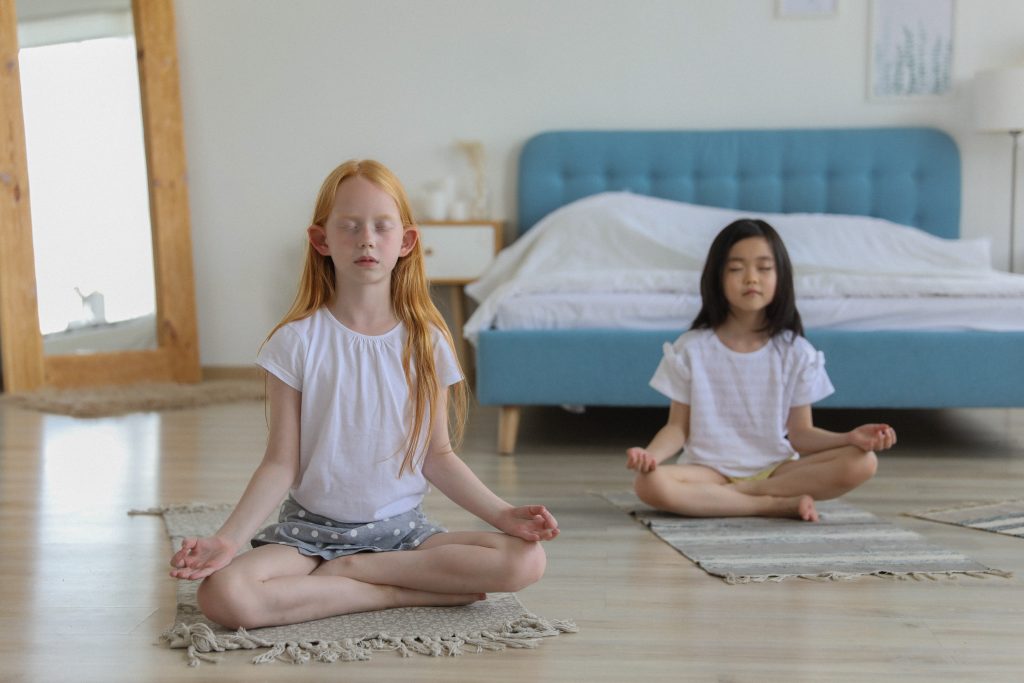By Andrea Poteet-Bell
It’s been two years since the COVID-19 pandemic hit, and we are still grappling with its effects. The pandemic shook our stability in almost every aspect. While we work towards economic recovery, market growth, and a return to what we knew as “normal,” there is another crisis that we need to address before it’s too late: the mental health crisis.
According to a scientific brief released by the World Health Organization (WHO) global prevalence of anxiety and depression increased by a whopping 25% within the first year of the COVID-19 pandemic. While WHO has called for global action and a wake-up call to this crisis, it’s important for each of us who can contribute to managing this crisis to stand up and play our part. One way to do this is to teach stress coping skills, like mindfulness, to children so they can navigate life better, especially in the volatility of a post-pandemic world.
Refresher: What is Mindfulness?
Mindfulness means awareness. Mindfulness is the ability to pay attention to what is happening in the present moment, with the attitude of openness, curiosity, and care, without judgments. Mindfulness techniques help us to become self-aware, acknowledge, accept and understand our thoughts, feelings, and emotions, manage them mindfully and choose our behaviors. Mindfulness is the core of social-emotional learning (SEL). When you are mindful, you are self-aware, you can regulate your emotions, make better decisions, be socially aware and improve your relationship skills. Now that we understand what mindfulness is, here are five benefits for teens and kids that practice it.
- Lowered Anxiety and Stress
Today, kids are experiencing extremely high levels of anxiety — from going through biological changes as they grow up to academic pressures. Teaching our young ones how to practice the art of mindfulness can help them learn how to turn from negative thoughts and focus on their breathing to return to a state of calm. Practicing mindfulness consistently makes it easy to do when you feel stressed out. It becomes an effective way to lower and manage anxiety and cope with stress positively.
- Improved Sleeping Habits
Kids are packed with energy and teens are frequently staring at phone or laptop screens during and after school. That makes it challenging for these groups to have a goodnight’s sleep consistently. But they need it the most as their bodies and minds grow quickly. Lack of sleep can negatively affect their moods, behaviors, and even weight.
Mindfulness helps your teens and kids calm their racing thoughts, put their minds to rest, and allow their bodies to shut down for a good night’s sleep. Sleep is the fuel needed to drive the body and mind every day.
- Boosted Cognitive Skills
Practicing mindfulness activates the prefrontal cortex part of the brain, especially in developing brains. The prefrontal cortex makes decisions and controls behaviors. Its activation through mindfulness leads to stronger executive functioning skills such as the ability to pay attention, plan, organize information, remember details, and solve problems. These boosted cognitive skills are also reflected in their academics. This is one of the reasons why many schools have implemented mindfulness programs for their students right from kindergarten. The benefits of boosted cognitive skills transcend the childhood stages and apply into adulthood.
- Enhanced Emotional Regulation Skills
Kids will always have big feelings that they may not fully understand. They are experiencing many new things in life that they may be unprepared for. As a result, it’s very easy for them to feel out of control. Practicing mindfulness will help them regain this control. Research shows mindfulness can change the structure and function of the brain’s amygdala, where our emotions live. Practicing mindfulness allows kids to connect with themselves on a deep level necessary for controlling their thoughts, emotions, and behaviors.
- Reduced Chances of Substance Abuse
We’ve mentioned that our kids today are under extreme pressure. The possibility of them finding comfort in substance abuse as a way to cope is high. But if introduced to mindfulness as a kid, your little one will be aware that it’s a healthy alternative for coping with pressure, anxiety, and stress well into adulthood. Kids, teens, and even adults exposed to mindfulness have higher chances of making better decisions. The art of mindfulness equips your young one with the necessary skills to cope in life, lowering their chances of turning to self-medication through drugs and substance abuse. When you teach your kids mindfulness, you give them the tools they need to handle the stress of everyday life in a healthy way. And that’s a skill that they can use for the rest of their lives.
Here is a short Mindful breathing practice by Gita that you can do with your kids & teens anytime:
“Find a comfortable place to sit with your back straight and your body relaxed. Let your eyes close or leave them open with a soft gaze. Take a few deep breaths in and breathe out thoroughly.
Feel your body sitting and breathing. Nice and easy breath. Whenever your mind wanders, thinking about the past or future, simply notice it and gently bring your attention back to your breath and to this moment, and breathing in and breathing out. Let your body breathe itself, nice and easy breath.
Then slowly come back to center, come back to this moment, and when you are ready gently open your eyes, look around the room, and notice how you feel right now.


